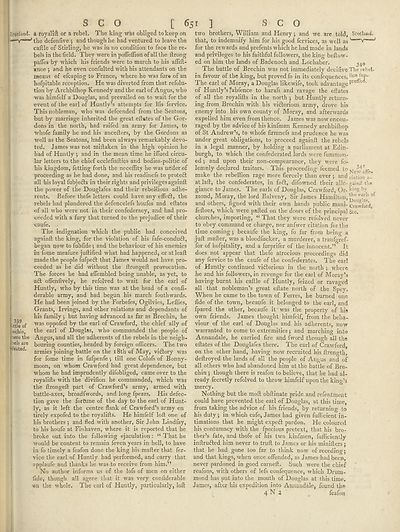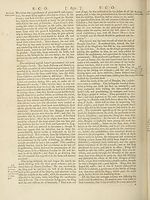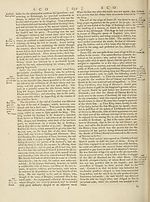Encyclopaedia Britannica, or, a Dictionary of arts, sciences, and miscellaneous literature : enlarged and improved. Illustrated with nearly six hundred engravings > Volume 18, RHI-SCR
(689) Page 651
Download files
Complete book:
Individual page:
Thumbnail gallery: Grid view | List view

CO [ 651 ] SCO
The king was obliged to keep on two brothers, William and Henry j and we are told, Scotland.
Scotland, a royalift or a rebel.
“—'v the defenfive j and though he had ventured to leave the
cattle of Stirling, he was in no condition to face the re¬
bels in the field. They were in poffefliort of all the ftrong
pafies by which his friends were to march to his aflift-
ance •, and he even confulted with his attendants on the
means of efcaping to France, where he was furs of an
hofpitable reception. He was diverted from that refolu-
tion by Arehbithop Kennedy and the earl of Angus, who
was himfelf a Douglas, and prevailed on to wait for the
event of the earl of Huntly’s attempts for h'is fervice.
This nobleman, who was defcended from the Seatons,
but by marriage inherited the great eftates of the Gor¬
dons in the north, had raifed an army for James, to
whofe family he and his anceftors, by the Gordons as
well as the Seatons, had been always remarkably devo¬
ted. James was not miftaken in the high opinion he
had of Huntly •, and in the mean time he iffued circu¬
lar letters to the chief ecclefiaftics and bodies-politic of
his kingdom, fetting forth the neceffity he was under of
proceeding as he had done, and his readinefs to protedl
all his loyal fubje&s in their rights and privileges againft
the power of the Douglafes and their rebellious adhe¬
rents. Before thefe letters could have any effect, the
rebels had plundered the defencelefs houfes and eflates
of all who were not in their confederacy, and had pro¬
ceeded with a fury that turned to the prejudice of their
caufe.
The indignation which the public had conceived
againft the king, for the violation of his fafe-condu£t,
began now to fubfide; and the behaviour of his enemies
in fome meafure juftified what had happened, or atleaft
made the people fufpett that James would not have pro¬
ceeded as he did without the ftrongeft provocation.
The forces he had affembled being unable, as yet, to
a£t oflenfively, he refolved to wait for the earl of
Huntly, who by this time was at the head of a confi-
derable army, and had begun his march fouthwards.
He had been joined by the Forbefes, Ogilvies, Lefties,
Grants, Irvings, and other relations and dependants of
his family; but having advanced as far as Brechin, he
was oppofed by the earl of Crawford, the chief ally of
the earl of Douglas, ■who commanded the people of
Angus, and all the adherents of the rebels in the neigh¬
bouring counties, headed by foreign officers. The two
armies joining battle on the 18th of May, victory was
for fome time in fufpenfe ; till one Colofs of Bonny-
moon, on whom Crawford had great dependence, but
whom he had imprudently difobliged, came over to the
royalifts with the divifion he commanded, which was
the ftrongeft part of Crawford’s army, armed with
battle-axes, broadfwords, and long fpears. His defec¬
tion gave the forttme of the day to the earl of Hunt¬
ly, as it left the centre flank of Crawford’s army en
tirely expofed to the royalifts. He himfelf loft one of
his brothers ; and fled with another, Sir John Lindfay,
to his houfe at Finhaven, where it is reported that he
broke out into the following ejaculation : “ That he
would be content to remain feven years in hell, to have
in fo timely a feafon done the king his mafter that fer¬
vice the earl of Huntly had performed, and carry that
applaufe and thanks he was to receive from him.”
No author informs us of the lofs of men on either
fide, though all agree that it was very confiderable
en the whole. The earl of Huntly, particularly, loft
339 „
ttle of
echin,
iHere the
)els are
•tfeated.
that, to indemnify him for his good fervices, as well as
for the rewards and prefents which he had made in lands
and privileges to his faithful followers, the king beftow-
ed on him the lands of Badenoch and Lochaber.
The battle of Brechin was not immediately decifive
in favour of the king, but proved fo in its confequences.
The earl of Moray, a Douglas likewife, took advantage
of Huntly’s fabfence to harafs and ravage the eftates
of all the royalifts in the north ; but Huntly return*,
ing from Brechin with his vittorious army, drove his
enemy into his own county of Moray, and afterwards
expelled him even from thence. James was now encou¬
raged by the advice of his kinfman Kennedy archbifhop
of St Andrew’s, to whofe firmnefs and prudence he was
under great obligations, to proceed againft the rebels
in a legal manner, by holding a parliament at Edin¬
burgh, to which the confederated lords were fummon-
ed and upon their non-compearance, they were fo-
lemnly declared traitors. This proceeding feemed to
make the rebellion rage more fiercely than ever 5 and
at laft, the Confederates, in faft, difowned their alle¬
giance to James. The earls of Douglas, Crawford, Or¬
mond, Moray, the lord Balveny, Sir James Hamilton,
and others, figned with their own hands public mani-
feftoes, which were parted on the doors of the principal
churches, importing, “ That they were refolved never
to obey command or charge, nor anfwer citation for the
time coming ; becaufe the king, fo far from being a
juft mafter, was a bloodfucker, a murderer, a tranfgref-
for of hofpitality, and a furprifer of the innocent.” It
does not appear that thefe atrocious proceedings did
any fervice to the caufe of the confederates. The earl
of Huntly continued viflorious in the north ; where
he and his followers, in revenge for the earl of Moray's
having burnt his caftle of Huntly, feized or ravaged
all that nobleman’s great eftate north of the Spey.
When he came to the town of Forres, he burned one
fide of the town, becaufe it belonged to the earl, and
fpared the other, becaufe it was the property of his
own friends. James thought himfelf, from the beha¬
viour of the earl of Douglas and his adherents, now
warranted to come to extremities j and marching into
Annandale, he carried fire and fword through all the
eftates of the Douglafes there. The earl of Crawford,
on the other hand, having now recruited his ftrength,
deftroyed the lands of all the people of Angus and of
all others who had abandoned him at the battle of Bre¬
chin j though there is reafon to believe, that he had al¬
ready fecretly refolved to throw himfelf upon the king’s
mercy.
Nothing but the moft obftinate pride and refentment
could have prevented the earl of Douglas, at this time,
from taking the advice of his friends, by returning to
his duty ; in which cafe, James had given fufficient in¬
timations that he might expeft pardon. He coloured
his contumacy with the fpecious pretext, that his bro¬
ther’s fate, and thofe of his two kinfmen, fufficiently
inftrufted him never to truft to James or his minifters;
that he had gone too far to think now of receding j
and that kings, when once offended, as James had been,
never pardoned in good earneft. Such were the chief
reafons, with others of lefs confequence, which Drum¬
mond has put into the mouth of Douglas at this time.
James, after his expedition into Annandale, found the
4 N 2 _ feafon
34°
The rebel¬
lion fup-
preffed.
34r
New affb-
ciation a-
gainlt the
king by
the earls of
Douglas,
Crawford,
See.
The king was obliged to keep on two brothers, William and Henry j and we are told, Scotland.
Scotland, a royalift or a rebel.
“—'v the defenfive j and though he had ventured to leave the
cattle of Stirling, he was in no condition to face the re¬
bels in the field. They were in poffefliort of all the ftrong
pafies by which his friends were to march to his aflift-
ance •, and he even confulted with his attendants on the
means of efcaping to France, where he was furs of an
hofpitable reception. He was diverted from that refolu-
tion by Arehbithop Kennedy and the earl of Angus, who
was himfelf a Douglas, and prevailed on to wait for the
event of the earl of Huntly’s attempts for h'is fervice.
This nobleman, who was defcended from the Seatons,
but by marriage inherited the great eftates of the Gor¬
dons in the north, had raifed an army for James, to
whofe family he and his anceftors, by the Gordons as
well as the Seatons, had been always remarkably devo¬
ted. James was not miftaken in the high opinion he
had of Huntly •, and in the mean time he iffued circu¬
lar letters to the chief ecclefiaftics and bodies-politic of
his kingdom, fetting forth the neceffity he was under of
proceeding as he had done, and his readinefs to protedl
all his loyal fubje&s in their rights and privileges againft
the power of the Douglafes and their rebellious adhe¬
rents. Before thefe letters could have any effect, the
rebels had plundered the defencelefs houfes and eflates
of all who were not in their confederacy, and had pro¬
ceeded with a fury that turned to the prejudice of their
caufe.
The indignation which the public had conceived
againft the king, for the violation of his fafe-condu£t,
began now to fubfide; and the behaviour of his enemies
in fome meafure juftified what had happened, or atleaft
made the people fufpett that James would not have pro¬
ceeded as he did without the ftrongeft provocation.
The forces he had affembled being unable, as yet, to
a£t oflenfively, he refolved to wait for the earl of
Huntly, who by this time was at the head of a confi-
derable army, and had begun his march fouthwards.
He had been joined by the Forbefes, Ogilvies, Lefties,
Grants, Irvings, and other relations and dependants of
his family; but having advanced as far as Brechin, he
was oppofed by the earl of Crawford, the chief ally of
the earl of Douglas, ■who commanded the people of
Angus, and all the adherents of the rebels in the neigh¬
bouring counties, headed by foreign officers. The two
armies joining battle on the 18th of May, victory was
for fome time in fufpenfe ; till one Colofs of Bonny-
moon, on whom Crawford had great dependence, but
whom he had imprudently difobliged, came over to the
royalifts with the divifion he commanded, which was
the ftrongeft part of Crawford’s army, armed with
battle-axes, broadfwords, and long fpears. His defec¬
tion gave the forttme of the day to the earl of Hunt¬
ly, as it left the centre flank of Crawford’s army en
tirely expofed to the royalifts. He himfelf loft one of
his brothers ; and fled with another, Sir John Lindfay,
to his houfe at Finhaven, where it is reported that he
broke out into the following ejaculation : “ That he
would be content to remain feven years in hell, to have
in fo timely a feafon done the king his mafter that fer¬
vice the earl of Huntly had performed, and carry that
applaufe and thanks he was to receive from him.”
No author informs us of the lofs of men on either
fide, though all agree that it was very confiderable
en the whole. The earl of Huntly, particularly, loft
339 „
ttle of
echin,
iHere the
)els are
•tfeated.
that, to indemnify him for his good fervices, as well as
for the rewards and prefents which he had made in lands
and privileges to his faithful followers, the king beftow-
ed on him the lands of Badenoch and Lochaber.
The battle of Brechin was not immediately decifive
in favour of the king, but proved fo in its confequences.
The earl of Moray, a Douglas likewife, took advantage
of Huntly’s fabfence to harafs and ravage the eftates
of all the royalifts in the north ; but Huntly return*,
ing from Brechin with his vittorious army, drove his
enemy into his own county of Moray, and afterwards
expelled him even from thence. James was now encou¬
raged by the advice of his kinfman Kennedy archbifhop
of St Andrew’s, to whofe firmnefs and prudence he was
under great obligations, to proceed againft the rebels
in a legal manner, by holding a parliament at Edin¬
burgh, to which the confederated lords were fummon-
ed and upon their non-compearance, they were fo-
lemnly declared traitors. This proceeding feemed to
make the rebellion rage more fiercely than ever 5 and
at laft, the Confederates, in faft, difowned their alle¬
giance to James. The earls of Douglas, Crawford, Or¬
mond, Moray, the lord Balveny, Sir James Hamilton,
and others, figned with their own hands public mani-
feftoes, which were parted on the doors of the principal
churches, importing, “ That they were refolved never
to obey command or charge, nor anfwer citation for the
time coming ; becaufe the king, fo far from being a
juft mafter, was a bloodfucker, a murderer, a tranfgref-
for of hofpitality, and a furprifer of the innocent.” It
does not appear that thefe atrocious proceedings did
any fervice to the caufe of the confederates. The earl
of Huntly continued viflorious in the north ; where
he and his followers, in revenge for the earl of Moray's
having burnt his caftle of Huntly, feized or ravaged
all that nobleman’s great eftate north of the Spey.
When he came to the town of Forres, he burned one
fide of the town, becaufe it belonged to the earl, and
fpared the other, becaufe it was the property of his
own friends. James thought himfelf, from the beha¬
viour of the earl of Douglas and his adherents, now
warranted to come to extremities j and marching into
Annandale, he carried fire and fword through all the
eftates of the Douglafes there. The earl of Crawford,
on the other hand, having now recruited his ftrength,
deftroyed the lands of all the people of Angus and of
all others who had abandoned him at the battle of Bre¬
chin j though there is reafon to believe, that he had al¬
ready fecretly refolved to throw himfelf upon the king’s
mercy.
Nothing but the moft obftinate pride and refentment
could have prevented the earl of Douglas, at this time,
from taking the advice of his friends, by returning to
his duty ; in which cafe, James had given fufficient in¬
timations that he might expeft pardon. He coloured
his contumacy with the fpecious pretext, that his bro¬
ther’s fate, and thofe of his two kinfmen, fufficiently
inftrufted him never to truft to James or his minifters;
that he had gone too far to think now of receding j
and that kings, when once offended, as James had been,
never pardoned in good earneft. Such were the chief
reafons, with others of lefs confequence, which Drum¬
mond has put into the mouth of Douglas at this time.
James, after his expedition into Annandale, found the
4 N 2 _ feafon
34°
The rebel¬
lion fup-
preffed.
34r
New affb-
ciation a-
gainlt the
king by
the earls of
Douglas,
Crawford,
See.
Set display mode to:
![]() Universal Viewer |
Universal Viewer | ![]() Mirador |
Large image | Transcription
Mirador |
Large image | Transcription
Images and transcriptions on this page, including medium image downloads, may be used under the Creative Commons Attribution 4.0 International Licence unless otherwise stated. ![]()
| Permanent URL | https://digital.nls.uk/193027664 |
|---|
| Attribution and copyright: |
|
|---|
| Description | Ten editions of 'Encyclopaedia Britannica', issued from 1768-1903, in 231 volumes. Originally issued in 100 weekly parts (3 volumes) between 1768 and 1771 by publishers: Colin Macfarquhar and Andrew Bell (Edinburgh); editor: William Smellie: engraver: Andrew Bell. Expanded editions in the 19th century featured more volumes and contributions from leading experts in their fields. Managed and published in Edinburgh up to the 9th edition (25 volumes, from 1875-1889); the 10th edition (1902-1903) re-issued the 9th edition, with 11 supplementary volumes. |
|---|---|
| Additional NLS resources: |
|

